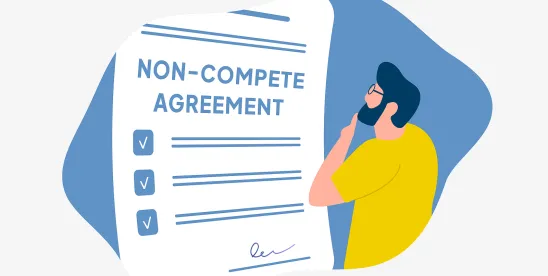Minnesota’s legislature rushed through several bills this year affecting recruiting and staffing associations and other service providers such as property management companies. One such law may, as one member of the Minnesota House of Representatives noted, have “profound” consequences for service providers regarding contractual conversion fees. As the law is largely unclear, this article provides legislative history and intent that may help service providers understand their potential obligations under the new laws.
Quick Hits
- Minnesota’s new law restricting “shadow noncompetes” is intended to close a statutory noncompete loophole for employees who are placed at a company by a service provider and unaware their direct employment by the service provider’s customer is restricted by an agreement between the two entities.
- The law may prohibit conversion fees if they are so “high” or “too large” as to deter customers from offering employment directly to workers placed with them.
- The law requires all employees working for a service provider under an agreement with a customer that violates state law to be given notice of the agreement and its restrictions (as of July 1, 2024).
- The law provides that the only exclusion from restricting employment covenants between two entities is for computer software development workers and “related services.” This exclusion is seemingly narrowly tailored to the tech industry where employees are hired, trained, and paid by the service provider, with the known objective to be placed with an employer following training, allowing the service provider to recoup those training fees and wages via the future restriction.
In 2023, Minnesota banned employment noncompete agreements signed on or after July 1, 2023. That law, Minn. Stat. 181.988, is specific to “an agreement between an employee and employer that restricts the employee, after termination of the employment.” According to Minnesota Representative Emma Greenman (DFL), chief author of the legislation, neither she nor other legislators were aware of so-called “shadow covenants” between a service provider and customer relating to an employee of a service provider at the time they passed that law last year. Shadow covenants are contracts between two entities “above the employee,” restricting the employee’s employment without their knowledge. Accordingly, in May 2024, Minnesota enacted a new law, included in Senate File (SF) 3852, an omnibus labor and industry policy bill, to void restrictive employment covenants in service contracts to “close the loophole.” The law, codified at Minn. Stat. 181.9881, provides that effective July 1, 2024, service providers cannot restrict customers from soliciting or hiring employees of the service provider, with the exception of certain computer software development workers. Unfortunately, the law leaves many important questions unanswered, including the validity of conversion fees. The law provides the following:
RESTRICTIVE EMPLOYMENT COVENANTS; VOID IN SERVICE CONTRACTS.
***
Subd. 2. Restrictive employment covenants; void and unenforceable. (a) No service provider may restrict, restrain, or prohibit in any way a customer from directly or indirectly soliciting or hiring an employee of a service provider.
(b) Any provision of an existing contract that violates paragraph (a) is void and unenforceable.
(c) When a provision in an existing contract violates this section, the service provider must provide notice to their employees of this section and the restrictive covenant in the existing contract that violates this section.
Subd. 3. Exemptions. This section does not apply to workers providing professional business consulting for computer software development and related services who are seeking employment through a service provider with the knowledge and intention of being considered for a permanent position of employment with the customer as their employer at a later date.
EFFECTIVE DATE. This section is effective July 1, 2024, and applies to contracts and agreements entered into on or after that date.
Agreements executed on or after July 1, 2024, may not have any provision that “restrict[s], restrain[s], or prohibit[s]” a customer from soliciting or hiring the service provider’s employee. Agreements that do have such provisions are void and unenforceable, and the service provider must provide notice to its employees of the law and the unenforceable provision of the agreement that it has with its customer.
It is unclear whether the notice provision applies to contracts entered into prior to July 1, 2024, because the law specifically states it only applies to contracts and agreements entered into on or after July 1. By way of legislative history, when the law was first introduced, the then-subdivision 3 stated that employers had one year to amend existing agreements to remove such restrictions or sign a memorandum of understanding (MOU) with the customer agreeing that the restrictions are void, and putting employees on notice of the same. In the committee meeting discussions removing this language, it was noted that the section was not needed since service providers would need to provide notice to employees for existing contracts.
Indeed, in the March 5, 2024, House Judiciary Finance and Civil Law Committee meeting in the state House of Representatives, Representative Greenman stated that the provision does not “disrupt current contracts but does require notice” to employees that the restrictions exist. Accordingly, it appears that the intent (and how Minnesota will regulate this) is that the notice provision applies to all contracts, and notice must be given to any employee who is currently working for a service provider that has a restrictive provision with its customer. Representative Greenman stated the purpose of providing employees notice that they are currently working under a restrictive covenant is so they have the “freedom to decide what they want to do.”
Also unclear is whether amending pre-July 1, 2024, contracts will render an agreement void (versus enforceable, but with employee notice). The law is silent. However, it may be a reasonable argument that so long as an amendment does not amend any restrictions, it does not trigger the law as the underlying contract was entered into on or before July 1, 2024.
Importantly, the law does not define “restrict” or “restrain.”
Thus, the (perhaps literal) million-dollar question for service providers is: Do conversion fees “restrain” or “restrict” a customer from hiring an employee of a service provider and thus void an agreement? According to Representative Greenman, “too large of a buyout … would restrict the freedom of workers to move.” She further stated that some contracts have monetary clauses that say if you hire someone you must pay $x, which is a liquidated damages idea, and “most appear to be high and restricting those transactions” as much as recouping those costs. Representative Harry Niska (R) also agreed that a “potential problem” was “too large of a buyout that restricts the movement” of employees—but stated the service provider is providing a connective service value and would be losing economic incentive to provide that value. One member of the public speaking at the hearing (against the bill) noted that the service provider benefit comes with a pre-negotiated conversion fee where all parties, including the employee, benefit—and if client companies have the unfettered ability to hire them, many of these consulting firms would choose not to operate in Minnesota. The speaker also said that the unintended consequences of the bill are “profound.” Accordingly, it seems that the state will interpret this law to disallow conversion fees if they are so large a buyout that the result would deter a customer from hiring the employee directly. What is “high” and “too large” is ripe for challenge. Arguably, the amount that would deter a customer from offering the position directly to the service provider’s employee will likely differ based on the customer.
As for the exemption for certain computer professionals, it is also unclear what “related services” are. Notably, in the April 30, 2024, conference committee meeting, Representative Greenman stated that the purpose of this exemption is to provide computer professionals with the opportunity to be recruited with the knowledge and intent to be hired at a later date. She was unable to define what “related services” are, but said it was “maybe development, maybe implementation.” Representative Greenman stated that based on information from talking with representatives from the tech industry, employees are hired, sometimes out of high school, provided a wage and training/internship, and then provided a job at an employer—all with the employee understanding the arrangement. She said this exemption is for those “tech jobs” that are clearly a “bridge not a barrier” to the employee. When asked about other industries, she stated this exemption is not intended to be “global.”
Another significant question is whether this law is even constitutional. Notably, comments were made at the various legislative committee hearings about the constitutionality of the law requiring employers to review their own contracts and determine if they are unlawful, and if so, forcing them to provide notice to their employees of the same, and provide the language of the restrictive covenant. In other words, the comments centered on the constitutionality regarding whether forcing service providers to determine if their conversion fee is so high that it restricts employment, and then disclosing that (confidential) fee amount to their employee.
Finally, as noted in the February 22, 2024, labor committee meeting, currently the only consequence for violating the law is that the provision of the contract is void. Unlike Minn. Stat. 181.988, there is no statutory penalty for violations such as attorneys’ fees (at this time).
Key Takeaways
- Service providers may want to consider whether any conversion fees in existing and future contracts with customers are so high as to deter the customer from offering employment to the placed employee.
- Service providers may want to review their existing contracts and determine whether notice is required to be provided to employees.
- Service providers providing workers in the tech industry may want to identify whether their workers may fall under the computer exemption and “related workers” by reviewing existing contracts and ensuring the employee has signed off on future contracts by acknowledging the restrictions with their placement related to the receipt of certain training benefits.




 />i
/>i

